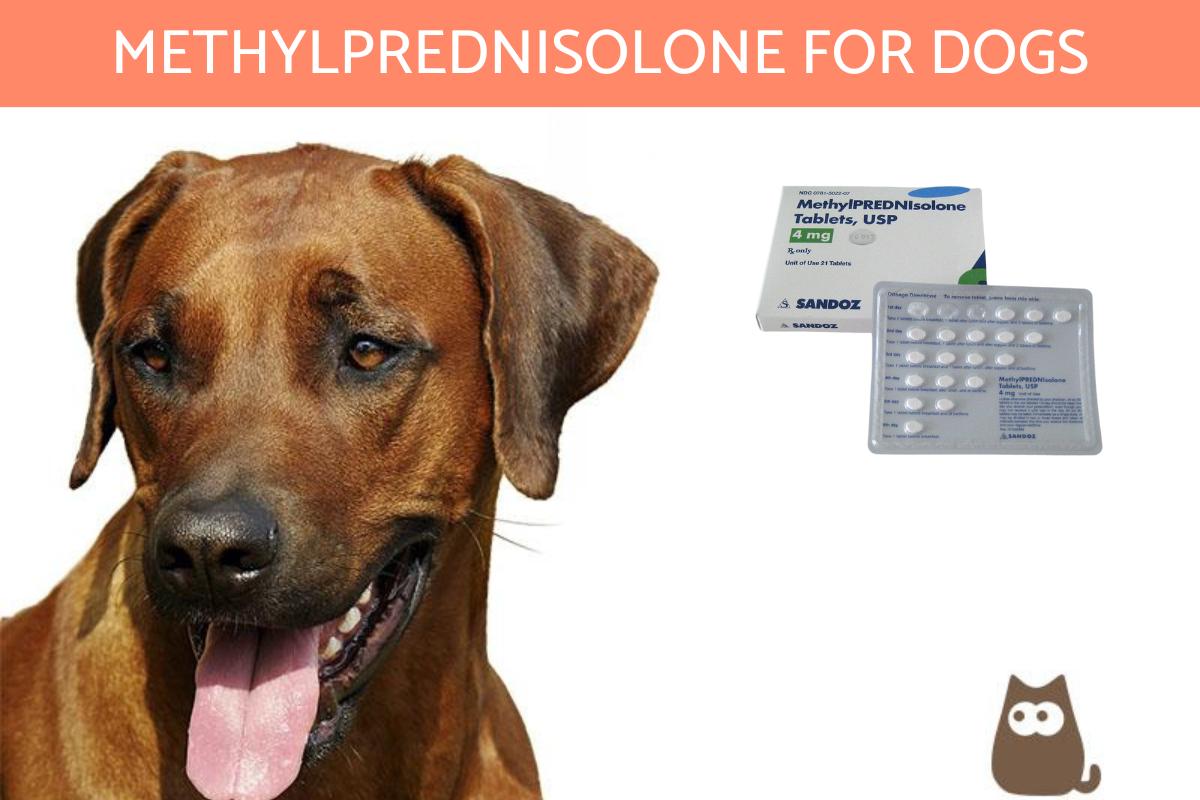Methylprednisolone for Dogs - Uses, Dosage and Side Effects



See files for Dogs
One important distinguishing factor between different medications is whether they are organic or synthetic drugs. Some may have a bias against synthetic drugs, but this is often more to do with perception than reality. Although they are created differently, synthetic drugs are designed to very specific parameters and are not anymore toxic than an organic drug if created to the right standard. Methylprednisolone is a synthetic drug with both anti-inflammatory and immunosuppressive effects.
Also known as depo-medrol, methylprednisolone for dogs is an appropriate treatment for many health issues in dogs. Despite its efficacy and relative safety, it is only to be used under prescription from a qualified veterinarian. AnimalWised explains the uses, doses and side effects of methylprednisolone for dogs so you can know what to expect if your dog is prescribed depo-medrol.
What is methylprednisolone for dogs?
Methylprednisolone is a synthetic drug, specifically a synthetic steroid designed to mimic the glucocorticoid action of glucocorticosteroids. It is a similar drug to prednisolone, the active metabolite of prednisone for dogs. It acts on the dog's immune system by having an immunosuppressive effect. When a dog's immune system reacts against certain pathogens, allergens or any other attacks, it will have an immune response which causes various symptoms.
Sold under brand names such as Depo-Medrol or Solu-Medrol, methylprednisolone works in a similar way. Inflammation of skin or other tissues is one of the most common immune responses in dogs. When a dog has an immune response which needs to be reduced, methylprednisolone can be given due to its anti-inflammatory and immunosuppressive effects.
Methylprednisolone can be given orally or parenterally. Its main preparations are:
- Oral tablets
- Injectable solution
- Powder for injectable solution
Although methylprednisolone can be used for anti-inflammatory and immunosuppressive effects, it may not be the best drug for your dog's condition. As it is not an over-the-counter drug, methylprednisolone must only be administered to your dog when prescribed by a veterinarian.
Methylprednisolone for dogs uses
Since methylprednisolone is a drug with anti-inflammatory and immunosuppressive effects, it is used for various inflammatory processes. Many of these are related to allergens since a dog's immune response when they experience an allergic reaction can result in inflammation. While this inflammation can be external or internal, methylprednisolone is commonly used for allergic skin inflammation know as atopic dermatitis in dogs.
Some examples of allergic and immune-mediated diseases in dogs which may be treated by methylprednisolone include:
- Hemolytic anemia
- Inflammatory bowel disease
- Various types of dermatitis
- Thrombocytopenia
- Osteoarthritis
- Pemphigus
Since there are various types of corticosteroids for dogs, your veterinarian will be required to assess the dog's clinical picture and prescribe the correct medication. Learn more about some of the uses of methylprednisolone in dogs with our article on inflammatory bowel disease in dogs.

Methylprednisolone dosage for dogs
As stated above, methylprednisolone is marketed in various preparations. For home use, the veterinarian will most likely prescribe the drug in tablet form. The injectable preparation is mostly used for emergencies, so it will likely only be administered by a veterinarian or clinician at a veterinary center. This is because the injectable solution has a faster action than the tablet form, so it may be required if the dog has entered anaphylactic shock.
The dosage of the methylprednisolone for dogs will be determined by the veterinarian based on the medical picture of the dog. This will include the dog's anamnesis (medical history), the problem from which they are suffering and other factors. The weight of the dog is also a significant factor. While it will depend on the aforementioned factors, there average dosage of methylprednisolone for dogs by weight is:
- 2 mg for dogs 5-15 lb
- 2-4 mg for dogs 15-40 lb
- 4-8 mg for dogs 40-80 lb
The duration of the treatment will also depend on the severity of the symptoms and other factors. The total daily dose can be divided into one or two doses, i.e. one dose every 24 hours or a half dose every 12 hours.
What we must take care of as guardians is to strictly comply with the administration guidelines established by the professional. In prolonged treatments with methylprednisolone, the drug should be withdrawn gradually and never suddenly. This drug is administered under strict veterinary control. Depending on the nature of the disease, the dose can be withdrawn or maintained at a minimum effectiveness for maintenance.
Contraindications of methylprednisolone for dogs
The use of methylprednisolone for dogs is not recommended in the following situations:
- Allergies: methylprednisolone should not be given to dogs allergic to its active substance or any of the drug's excipients.
- Viral diseases: not recommended to use if the dog is suffering from a disease caused by viruses during the viremic phase in which the virus infects the tissues.
- Bacterial or fungal infections: it is also not recommended if the infestation is caused by systemic fungal infection or if it is bacterial and antibiotic treatment has not been established.
- Ulcers: not the drug of choice if the dog is suffering from gastrointestinal or corneal ulcers, in addition to Cushing's disease in dogs.
- Pregnancy: pregnant bitches cannot be treated with methylprednisolone, as fetal malformations or, towards the end of pregnancy, premature births or abortions could occur.
In general, methylprednisolone is not recommended for dogs with weakened immune systems. Only in emergency cases should it be given to dogs with diabetes, kidney or heart disease, hyperadrenocorticism, or osteoporosis.
It is also not recommended to vaccinate a dog undergoing treatment with methylprednisolone or in the two weeks following its completion. This is due to its interaction with the immune system, which may reduce the response to the vaccine. Learn more with our article on vaccination schedules for dogs.

Side effects of methylprednisolone for dogs
Although it is considered a relatively safe drug, there are potential side effects. Methylprednisolone may cause dogs to develop the following adverse reactions:
- Affect growth of puppies
- Increase fluid retention
- Polydipsia (excessive thirst)
- Polyuria (increased urination)
- Elevation of liver enzymes
As we stated above, methylprednisolone can also increase the risk of Cushing's syndrome. If you witness any symptoms of possible adverse effects of this or any drug, contact your veterinarian immediately.
This article is purely informative. AnimalWised does not have the authority to prescribe any veterinary treatment or create a diagnosis. We invite you to take your pet to the veterinarian if they are suffering from any condition or pain.
If you want to read similar articles to Methylprednisolone for Dogs - Uses, Dosage and Side Effects, we recommend you visit our Medicine category.







